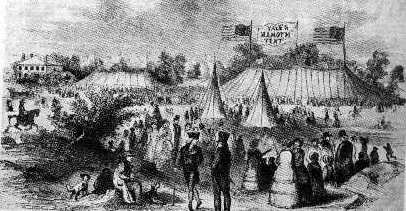
"
Education: A Debt Due from Present to Future Generations"- George Peabody, 1852P
EABODY SCHOOL HISTORY PROJECTPROJECT MOTTO:
"EDUCATION: A DEBT DUE FROM PRESENT TO FUTURE GENERATIONS."
One of the poor children who benefited from John Endecott’s order lived on the Old Boston Road (Washington Street) at the turn of the nineteenth century. The few years of schooling that George Peabody received during his lifetime were spent at the first school in the Center district located on the square in the southern village of Danvers (now Peabody).
After attaining great success and wealth, Peabody never forgot the education he received in the common schools. He was invited by town officials to attend the celebration in June 1852 that marked the one hundredth anniversary of the separation of Danvers from Salem,

Danvers Centennial Celebration, 1852 – Tents erected in the South Parish
From a woodcut in "Gleason’s Pictorial" published in Chronicles of Danvers by Harriet Sylvester Tapley.
Peabody declined the invitation in a letter from London, dated 26th May, 1852. "I should have the greatest pleasure in joining in your interesting celebration there, if possible. The early associations of my life are clustered around our ancient town. It was, as many of you know, in a very humble house in the South Parish that I was born, and from the Common Schools of that Parish, such as they were in 1803 to 1807, I obtained the limited education my parents means could afford; but to the principles there inculcated in childhood and early youth, I owe much of the foundation for such success as Heaven has been pleased to grant me during a long business life. Though my manhood, before coming to England, was spent in Baltimore, (which shares with my native town in my kindest feelings,) I still cherish the recollections of my earlier days, and anticipate, with much pleasure, a visit to the Old Parish, that I may witness the great strides I am told you have been making in wealth and improvements." (Account of the Centennial Celebration at Danvers, Mass., 1852, p. 167-171.)
Peabody also enclosed a sealed envelope with instructions that it should not be opened until the toasts were being proposed. Following many speeches a toast was made to George Peabody of London, the seal of the envelope was broken and the sentiment he proposed was read: "Education – a debt due from present to future generations."
He wrote, "In acknowledgment of the payment of that debt by the generation which preceded me in my native town of Danvers, and to aid in its prompt future discharge, I give to the inhabitants of that town the sum of twenty thousand dollars for the promotion of knowledge and morality among them." - George Peabody, William Desmond Chapple, Peabody Museum of Salem, Mass., 1948, p. 10.
In 1867, when Peabody visited the town of Danvers for the purpose of meeting the children of various public schools, graduates of the High School and citizens, he said, "It is especially fitting, my friends, that the work of education should be zealously carried on in this ancient town and county, that we do no discredit to the ancestors who inaugurated that work. The first land holder of Danvers – John Endicott – was the first to suggest the system of free common schools, to which Massachusetts owes so much, and which, from the little germ planted in this very town…have grown up to bear fruit not alone for the locality and State, but it has spread its branches more and more widely and is shedding its blessings on every portion of our great country." - "George Peabody at Danvers", Danvers Monitor Extra, 4/17/1867
NOTES:
Biographer Franklin Parker writes, "International merchant and financier, benefactor of numerous philanthropies both in the United States and England, and the first American to be named an honorary citizen of the City of London, George Peabody never departed from the Puritan principles of industry, frugality, and humility by which he was reared. Born in 1795 to a Massachusetts family of modest means, Peabody received only four years of formal education. He was making his own way at the age of seventeen. By the time he was twenty-two, he had amassed more than forty thousand dollars; when he was thirty-two his assets amount to $85,000. After moving to London in 1837, Peabody gained a multi-million dollar fortune through shrewd investments and a reputation for impeccable honesty and integrity. It is for his philanthropies, however, that Peabody is best remembered. A bachelor he decided early to devote himself to the support of deserving causes. The Peabody Institute in Baltimore is considered a forerunner of the numerous foundations in America today. Peabody Institutes in other cities, Peabody Public Libraries, Peabody Museums of Science, the Peabody Conservatory of Music, and the Peabody Homes for the ‘industrious poor’ in London all owe their existence to the benevolence of George Peabody. In the Southern states after the Civil War, he established the Peabody Education Fund, which made the free education of all races a public obligation. From this movement emerged George Peabody College or Vanderbilt University in Nashville, Tennessee, still regarded as one of the premier schools of education in this country." (Franklin Parker, "George Peabody – A Biography", Vanderbilt University Press, Nashville, Tennessee, 1995)